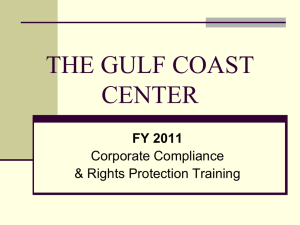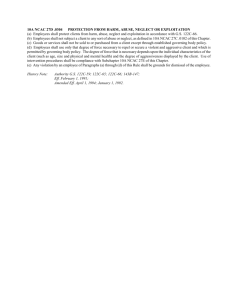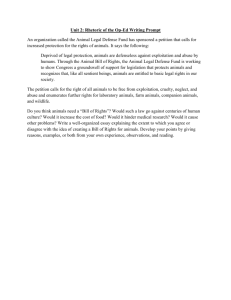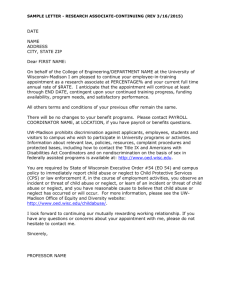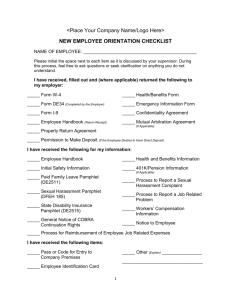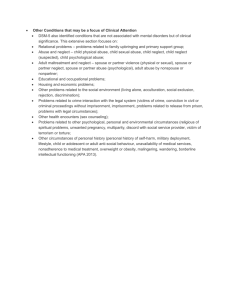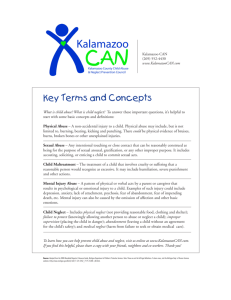THE GULF COAST CENTER
advertisement
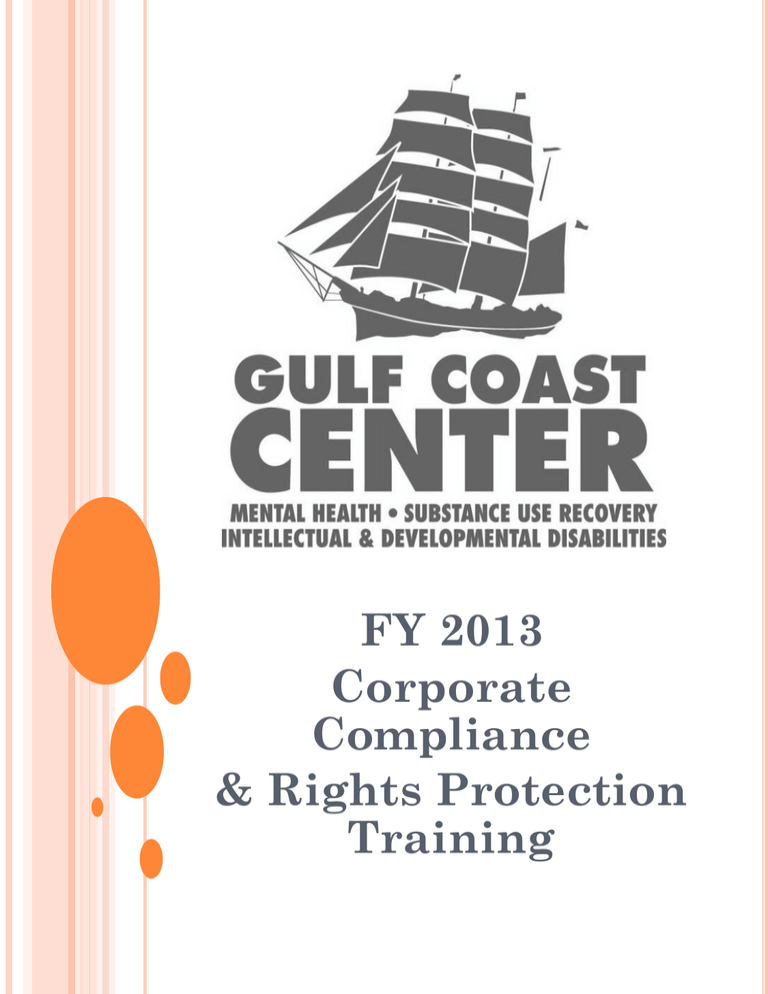
FY 2013 Corporate Compliance & Rights Protection Training REASONS FOR A COMPLIANCE PLAN To prevent unwanted events from happening intentionally and unintentionally. To help the organization learn about these unwanted events first. If they do occur and the organization does not learn about them first, an effective plan can help mitigate or reduce negative effects by showing that they are 2 exceptions. SEVEN ELEMENTS OF EFFECTIVE COMPLIANCE PLANS 1. Written standards of conduct for all employees, contractors and volunteers that promote a clear commitment to compliance. 2. The appointment of high level individuals in the organization to oversee the compliance effort. 3. Due care taken by the organization to not delegate responsibility or authority to those who may engage in illegal activity. 4. Effective training and 3 SEVEN ELEMENTS …CONTINUED 5. Monitoring and reporting systems to uncover potential problems and to encourage the reporting of potential problems by employees without fear of retaliation. 6. Disciplinary systems for noncompliant employees - and their managers- that are consistently enforced at all levels of the organization. 7. Reasonable steps taken to respond appropriately to detected offenses and to 4 prevent reoccurrence. GAO: 3 PRIMARY CATEGORIES OF FRAUD AND ABUSE Improper billing practices: upcoding, phantom treatment, delivering more treatment than necessary. Misrepresenting qualifications: lapsed, expired or false credentials; performing outside the bounds of one’s license. Improper business practices: kickbacks for referrals to a provider, cost report issues, enhancement of profits by limiting care. 5 LAWS TO BE AWARE OF The Federal Antikickback Statute The Stark Law The Texas Illegal Remuneration Statute Civil Money Penalties Statute The Federal False Claims Act The Medicaid Fraud Prevention Act 6 THE ANTI-KICKBACK STATUTE Applies to everyone not just licensed staff “knowingly & willfully” - There must be intent to engage in wrongful act “solicits or receives/offers or pays” – the prohibition applies both to the offer and acceptance of a kickback. “Remuneration, directly or indirectly…” – does not require exchanges of money just anything of value. 7 THE STARK LAW- “SELF REFERRALS” Physician must have a financial relationship with an entity Referrals to self or entity owned or receiving compensation No proof of intent to violate the statute is required to impose penalties 8 THE FEDERAL FALSE CLAIMS ACT Submitting or causing to be submitted a claim for payment using a false record. Knowingly or with reckless disregard or deliberate ignorance of the falsity of the claim. Fines can be enormous. Fraud Enforcement and Recovery Act expanded FCA to include claims to non government payors. Creates liability for knowingly concealing the retention of an overpayment. 9 MEDICAID FRAUD PREVENTION ACT Applies to everyone not just licensed staff Knowledge or acts with conscious indifference or reckless disregard Provides a multitude of actions that constitute fraud, including actions by managed care organizations. Penalties: Revocation of provider agreement, Medicaid Exclusion list for no less than 10 yrs., state license discipline, and 10 monetary restitution. PROVIDER EXCLUSIONS DATABASE Any individual or entity that provides or is involved in the provision of, or billing for services or items reimbursable by federal health care programs may be excluded (MDs, nurses, aides, PTs, billing companies, non-licensed persons involved in some aspect of health care industry). Most common exclusions include: license revocation/suspension, program-related convictions, patient abuse and neglect and default on health education loans. Exclusion does not expire or end on its own terms; an individual or entity must apply to the OIG for reinstatement. Liability for using an excluded individual or entity include: o Civil money penalty of $10K for each item or service claimed 11 o Assessment of up to three times the amount claimed o The violating entity could be added QUI TAM ACT A PROVISION UNDER THE FEDERAL CIVIL FALSE CLAIMS ACT Qui Tam is also known as “Whistleblower Act” Actions can be brought by individuals even if government declines prosecution Suits are filed under seal with the US Attorney. Individual filing suit must be “original source.” Financial rewards for Qui Tam plaintiffs can be significant – 25% 30% of proceeds from the action or settlement. Disgruntled employees and competitors frequently Qui Tam plaintiffs. 12 REPORTING COMPLIANCE ISSUES (CODE OF CONDUCT, # 14) As a general rule, report to your supervisor As another option you may report directly to the Compliance Officer, Cindy Kegg o In person at the League City office o Phone / voice mail: 1-888-839-3229 o Interoffice mail (send to GCCLeague City) o U.S. Mail: 4444 W. Main League City 77573 o E-mail: cindyk@gulfcoastcenter.org o FAX: (281) 338-2460 DO NOT MAKE THE EASY MISTAKE OF FAXING TO 388-2460 (this is a CPA Office in Alvin!) 13 ACTION TAKEN IN DETECTED COMPLIANCE OFFENSES AND OTHER CONFIRMED CASES OF MISCONDUCT (INCLUDING ABUSE NEGLECT AND EXPLOITATION) Considerations: Seriousness, Circumstances, Work Record, Length between violations Possible Actions: Required Training, Written Reprimand, Probation, Demotion, Reassignment, Termination, Disclosures as required by Law Confirmed Cases of Abuse, Neglect or Exploitation: Reported in CANRS May be reported to the Employee Misconduct Registry, effective September 1, 2010. (Senate Bill 806, 81st Legislature) Compliance Detected Offenses: May Include a Corrective Action Plan Reassignment may occur during an investigation 14 RESPONSIBILITIES OF SUPERVISORS/MANAGERS (CODE OF CONDUCT, # 3) Supervisory staff must: Promote, adhere to and participate in the compliance program Ensure adherence to and participation in the compliance program by employees they are responsible for managing Instruct supervised personnel on the strict adherence to the compliance program, policies/procedures and legal requirements as a condition of employment Instruct supervised personnel that the Center may take disciplinary action up to and including termination for violations of the compliance program, policies / procedures or legal requirements Supervisors/Managers should be aware that: They will be held accountable for failure to detect non-compliance with applicable policies/procedures/legal requirements where reasonable diligence on the part of the supervisor or manager would have led to the discovery of the 15 BUSINESS CODE OF CONDUCT (NOTE BOLDED & UNDERLINED REVISIONS) 1. Statement of Purpose 2. Ethical Standards 3. Leadership Responsibilities 4. Conflict of Interest/Outside Business and Financial Interests 5. Gifts and Favors 6. Compliance 7. Accounting and Reporting 16 CONFLICTS OF INTEREST IN GENERAL (CODE OF CONDUCT, # 4) Staff are obligated to remain free of conflicts of interest in the performance of your responsibilities to the Center. A conflict of interest may exist if your outside activities or personal interests influence or appear to influence your ability to make objective decisions in you job responsibilities. A conflict may exist if the demands of any outside activities hinder or distract you from the performance of your job or cause you to use Center resources for other than Center purposes. Remember, policy 13.51 Outside Employment specifically states that nonCenter employment may be granted at the discretion of the ED and shall be documented in the employee’s personnel file prior to the acceptance of such employment. 17 THE BOARD OF TRUSTEES AND CENTER EMPLOYEES MAY NOT HAVE A CONFLICT OF INTEREST WITH CONTRACTS MANAGEMENT (CODE OF CONDUCT # 4) Employed by Contractor Receiving paid consultation by Contractor Received > 10% of your Gross Income for the previous year from Contractor Are a Member of Contractor’s Board of Trustees/Directors Have Ownership > 10% of voting stock of shares of the Contractor Have Ownership of > 10% / $5000 of the Fair Market Value of the Contractor 18 BUSINESS CODE OF CONDUCT…CONTINUED 8. 9. 10. 11. 12. Corporate Resources Political Activities Confidentiality Employee Relations Customer Focus / Client Relations 13. Controlled Substances 14. Reporting Misconduct 15. Risk Reporting 19 PROTECTING CONFIDENTIALITY (CODE OF CONDUCT, # 10) You have breached confidentiality if you disclose information to a third party who is not involved in furthering care or does not have a legitimate need to know. People included in furthering care are doctors, nurses, social workers, service coordinators & others directly involved in the care of the individual. People not included in furthering care are those in environmental services, personnel, patient friend’s and family, your friends, and colleagues not involved in the care of the individual. The Mental Health Code (MHC) does allow the release of information to law enforcement if there is a threat of harm to self or others, or to assist in medical evaluation or treatment. If your employment ends, you are still bound to maintain confidentiality of all records and information accessed during your employment. Information is not given to: family members or friends without a release, law enforcement who do not meet the MHC exceptions, legislature, or 20 Center personnel not involved in care. THE HITECH ACT & BREACH NOTIFICATION The act defines a breach as the “unauthorized acquisition, access, use or disclosure of protected health information which compromises the security or privacy of the protected health info, except where an unauthorized person to whom such information is disclosed would not reasonably have been able to retain such information . Must notify the consumer/client within 60 days of discovery of the breach Notification shall include: description of what happened, what info was involved, steps they should take, and steps we have taken, and contact procedures for if they have questions. If more than 500 people involved …must notify the media Requires encryption of data [safetosend] Red Flags for Identity Theft: Appointment scheduling and patient registration: info looks forged, doesn’t know DOB, physical description does not match identifying info. o Delivery of services: records indicate treatment inconsistent with exam, info in record contradicts what is already known of client, o Consumer/client billing and questions : address discrepancies, consumer disputes bill claiming identity theft, consumer receives 21 a bill for services not received, address change that doesn’t seem legitimate. o Inquiries from Third Party: law enforcement, SSA notifies us the consumer is dead, USPS informs us not an accurate address, contact from an insurance fraud investigator o HIPAA...STAFF ACTIONS Employees access PHI only to the degree necessary to perform their jobs. Staff should only have access to PHI regarding the consumers that they are working with, not other persons receiving services Any staff persons outside the interdisciplinary team working with a consumer probably do not have a need to know PHI about the individual If you are unsure of who to release information to, DON’T RELEASE IT!!! Check with your Supervisor, or Linda Bell, Director of Legal Affairs. 22 Staff Actions Employees do not identify a person directly or indirectly as a recipient of services. When receiving a phone call, fax, or e-mail, staff should not confirm or deny that a person receives services at Gulf Coast Center. Confirming that a consumer is at the facility would be violating HIPAA Privacy Rules 23 Staff Actions Employees have a duty to safeguard PHI from intentional or unintentional use of disclosure that is in violation of the HIPAA Privacy Rule by… Keeping records locked up when not in use. Users should log off their computers while away from their desks. Computer screens should not be in plain sight of public Written information in nurse stations, desks, etc., should be covered from public view. Discussions about consumers should be made in private, away from public areas. Electronic records should be kept secure. Facilities should monitor who accesses PHI. Paper records should be shredded and never left in the garbage for disposal with regular trash. Do not share your computer password with anyone. Create a password that is 24 unique and difficult for someone else to guess. Do not write it down where someone else can see it or find it. Staff Actions Employees refer requests for PHI, requests from persons served to amend records, and related requests to the appropriate office. All requests made by consumers should be made to Liz Bennett, Technical Assistant Medical Records Administration, located at Southern Brazoria County CSC: o o o Direct line: (281) 585-7389 or; SBCSC (979) 848-0933 x11313 Fax: (979) 848-0937 (call to confirm receipt of fax) If you receive a subpoena, court order, or a request for an affidavit, notify Liz Bennett immediately. 25 Staff Actions Employees report or assist others in reporting suspected privacy rights / HIPAA violations If an employee or consumer wishes to make a complaint about The Gulf Coast Center, call or refer them to: o Cindy Kegg, The Gulf Coast Center’s Rights Protection Officer/Corporate Compliance Officer o TDSHS or TDADS Office of Consumer Services and Rights Protection o U.S. Department of Health and Human Services o Texas Attorney General’s Office 26 NO HARASSMENT SEXUAL OR OTHERWISE (CODE OF CONDUCT , # 11) Any form of harassment violates federal, state and local law Harassment could be related to race, creed, color, sex, sexual orientation, national origin, ancestry, citizenship status, marital status, pregnancy, age, medical condition, handicap and/or disability Harassment does include offensive remarks or jokes, other verbal, graphic, physical conduct and/or threats of physical aggression (note: as part of our commitment to safety, we have a No Weapons Policy) If you feel a staff, consumer, vendor or supplier is harassing you, report the harassment immediately to a supervisor. If the supervisor is involved or you feel they can not or will not address the issue, contact the Chief Operations Officer, HR Director, or Center Attorney. Regardless of who you report to, the complaint will be immediately forwarded to the Center Attorney who will initiate an investigation within 5 business days. The Center can only resolve an issue of harassment if we know about it. Therefore, it is your responsibility to bring these kinds of 27 problems to our attention so that we can take the necessary steps to correct the problem or issue at hand If you have any questions as to what constitutes HARASSMENT IN A NUTSHELL (CODE OF CONDUCT # 11) Simple teasing, off-handed comments, and isolated incidents of harassment, unless very serious, will generally not constitute actionable harassment in a court of law. However, it may lead to disciplinary action, up to and including termination depending upon the circumstances of the situation. Sexual harassment is actionable under Title VII only if it is so “severe and persistent” as to alter the conditions of the person’s employment and create an abusive working environment The four elements which will be used to make this determination are: the frequency of the event or action; the severity; whether the event or action was physically threatening or intimidating, and whether it unreasonably interferes with the job performance, however this does not include a 28 “mere offensive utterance.” INTERNAL INVESTIGATION ETIQUETTE Investigations shall only be initiated by the Executive Director, Legal Affairs Director, HR Manager, or the Rights and Compliance Officer. EXCEPTION: Investigations involving Connect Transit and its services shall be investigated by Asset Management and/or Facility and Transportation Services staff. Investigations shall be initiated due to harassment allegations, employee misconduct, and/or consumerrelated complaints. Unless directed by one of the individuals listed above, staff do not have the authority to initiate investigations against fellow staff, contractors, or consumers. Investigating does include and is not limited to photographing, monitoring and documenting activity, reading internal and external mail, and recording conversations without the other persons knowledge and consent. Staff involved in unauthorized investigative tactics will be subject to disciplinary action up to and including termination. During an investigation, staff must never conceal, destroy or alter documents; lie; or make misleading statements to authorized Center staff conducting the investigation. Staff who violate this requirement shall be terminated. Full 29 cooperation is required and includes providing complete timely and thorough information promptly. CONSUMER / CLIENT RELATIONS (CODE OF CONDUCT # 12) All consumers/clients deserve to be treated with respect and dignity and have the right to be involved in their care. Dignity and respect include the elimination of prejudicial language It is the responsibility of each employee to ensure that the rights of clients are protected. Each employee must familiarize themselves with rights set forth in policy, procedures and in the rights protection handbook. 30 FORBIDDEN CONSUMER EMPLOYEE RELATIONSHIPS (CODE OF CONDUCT # 12) Dating Implied Sexual and Sexual in Nature Contacts (i.e., physical act, telephonic and electronic) No Living Arrangement Agreements No loans or storing/holding of Consumer Funds/Money Staff may accept no monetary gifts. Policy does allow acceptance of gifts of <$50.00. Recovery programs can not accepts gifts, monetary or otherwise Consumers can not do chores (i.e. picking up trash or cleaning restrooms) for cigarettes or other privileges; this is a violation of the Department of Labor Caution: Telephone communications should be limited to Center Business due to misinterpretations of others. Caution: If a consumer/client has a business and you would like to bid for his services or have him do some work for you do realize that there may be some ramifications for such action. The relationship may appear to have 31 some form of exploitation. Caution: Avoid the appearance of PREVENTING ABUSE, NEGLECT AND EXPLOITATION Learn your Job Understand expectations and focus on doing your job well. Communication Don’t take your anger or frustration out on persons served or their families. Do your part to help foster positive relationships with co-workers and keep morale high. Stress Management Manage your stress levels. Personal Problem Management Leave personal problems outside of the workplace. If you are having difficulty with this, speak to your supervisor. Seek help if you need it! 32 RECOGNIZING SIGNS / SYMPTOMS OF POSSIBLE ABUSE (CODE OF CONDUCT # 12) Multiple scratches, cuts, bruises, burns Unusual patterns of injuries Inadequate or illogical explanation of injury Serious injuries: sprains, breaks, bedsores Reports of confinement Passive, withdrawn behavior with certain people Reluctance to participate in physical exams 33 RECOGNIZING SIGNS / SYMPTOMS OF POSSIBLE NEGLECT (CODE OF CONDUCT # 12) Lack of food or malnourishment Lack of water or dehydration Withholding meds/overmedicating Inadequate shelter Unsanitary living conditions Untreated health problems Lack of personal hygiene / clothes 34 EXAMPLES OF EXPLOITATION (CODE OF CONDUCT # 12) Taking, holding, borrowing money Taking Social Security /SSI checks Taking property Exchanging items of unequal value Requesting items to be purchased for staff Using consumers as free labor 35 REPORTING ALLEGATIONS OF SUSPECTED ABUSE, NEGLECT OR EXPLOITATION ALL staff have the responsibility to report. Immediately (within 1 hour) make a report to DFPS via the reporting website: o www.txabusehotline.org or; o call 1-800-647-7418 Complete an Incident Report within 24 hours and fax to RPO if the alleged perpetrator is a Center staff or contract staff Employees and Consumers are protected from retaliation when reporting. 36 SUBSTANCE USE RECOVERY SERVICES REPORTING ALLEGATIONS OF SUSPECTED ABUSE, NEGLECT OR EXPLOITATION WHEN THE ALLEGED PERPETRATOR IS A CENTER STAFF OR CONTRACT STAFF All staff have responsibility to report. Immediately (within 1 hour) make a report to: Rights Officer at 1-888-839-3229 Complete an Incident Report within 24 hours and fax to Rights Protection Officer Employees and Consumers are protected from retaliation when reporting. Department of State Health Service notified within 24 hrs Investigative Report submitted to DSHS upon completion DSHS may accept findings or reinvestigate If the client also has a Mental Health , diagnosis follow guidelines for reporting to 37 DFPS on previous slide If the AP is not a Center staff or contract staff, report to proper authorities REPORTING…CONTINUED DO NOT notify the alleged perpetrator of the impending investigation. DO NOT conduct a miniinvestigation. DO NOT discuss incident with others (with the possible exception of your supervisor). DO preserve the safety of the person and arrange for emotional support or medical care as appropriate DO protect any evidence (i.e.. ake pictures, secure the record, etc.) DO cooperate with DFPS investigators 38 WHEN YOU MAY NOT RELEASE INFORMATION ON A CENTER CLIENT The “Interpretive Guidance on Laws Pertaining to Privacy of Mental Health and Mental Retardation Records for the MHMR Service Delivery System” pursuant to the TAC Protected Health Information, Chapter 414, Subchapter A, states: §When Authorization is not Required to Use or Disclose Protected Health Information that Relates to MHMR Services (b) When required or authorized by law (3) A component may disclose PHI to the Department of Family and Protective Services) when necessary to report or cooperate in the investigation of suspected child abuse or neglect. However, the PHI of a parent or other person responsible for the care of the child who is the subject 39 of the report or investigation may only be disclosed pursuant to a court order. What Happens When a DFPS Investigation Occurs? DFPS receives a report (website or 1-800 number) Notifies RPO RPO notifies ED, Review Committee, Supervisor Request for Review forwarded to Assistant Commissioner of APS APS initiates an investigation APS mails completed investigative report to RPO upon completion Copy of report given to ED, Review Committee and (if confirmed), to staff; Case reviewed Agree with finding s Disagree with findings 40 Case Closed REPORTING DEATHS Immediately report known information to the RPO & treatment team (email or phone) Complete an incident report within 24 hours and submit to the RPO via fax or electronically If hand written, put original in Center mail to the RPO (in League City) after notification In some cases, staff may be requested to assist the RPO in obtaining information regarding cause & manner of death (e.g. no autopsy is conducted, family agrees to send findings/death certificate to staff) Upon death, authorization for release of the record can be legally given by the 1) personal representative, 2) parent, 3) adult children or 4) spouse. This does not apply to other relatives, including siblings. (Please follow procedures for release of medical records). 41 The death of a former service recipient should also be reported to the RPO upon discovery INCIDENT REPORTS…WHEN TO REPORT (CODE OF CONDUCT #15) • Actual or suspected abuse, neglect or exploitation /other rights violations when a staff person is the alleged perpetrator • Vehicle Accidents & Injuries(client or staff) Report immediately to • James Rollens III • at 713-545-7595 • Violent behavior • (client or staff) • Threats or acts of aggression (client or staff) • Destruction /loss • of property (client or staff) • Illegal behavior (client or staff) Medical emergencies Psychiatric emergencies Serious infraction of program rules (client or staff) Loss of consumer record Use of personal restraint (if not part of approved Behavior Plan) Missing consumer Death of consumer Fire Violations of the 42 Business Code of Conduct, as appropriate. EMAILS W PHI INCIDENT REPORTS …PROCEDURES The following reports must be submitted to the RPO within 24 hours: 1) abuse/ neglect/ exploitation/ other rights issues (when staff is the alleged perpetrator) 2) deaths (active clients) 3) incidents involving workman’s comp (also fax to Ricki at Admin!) All other reports must be submitted to the RPO within 48 hours Write legibly Fill in all appropriate blanks Include your response / follow-up to incident then… 1) Fax to RPO in League City: 281-338-2460 / Send original to RPO immediately, or 2) Submit electronically REMEMBER, 43 Do not keep a copy or put a copy In order to get credit for this training you must: Sign In & Sign & Turn in the Employee Affirmation 44
